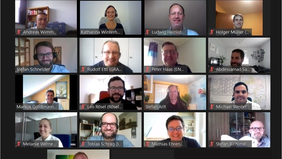On Thursday, July 02, 2020, a kick-off meeting of a special kind took place at the Institute for New Energy Systems (InES) at Ingolstadt University of Technology (THI). On invitation of the project leading professors Goldbrunner and Schrag, 11 representatives of medium-sized companies in Bavaria met for a first virtual project kick-off for the technology development project "Rural Energy Supply of the Future" (LEnZ) in the digital space.
Supported by the European Fund for Regional Development and the Free State of Bavaria, the InES and its 11 corporate partners are focusing on rural areas as key regions for energy system transformation until October 2022. Building on the predecessor projects of the "Biogas 4.0" innovation centre and the "Heat & Housing" competence centre, the project focuses on the coupled use of biomass and solar energy as well as innovative solutions for energy self-sufficiency in rural areas.
Among the participants and for the first time partners in an InES project are soleg GmbH from Teisnach, varmeco GmbH & Co. KG with headquarters in Kaufbeuren, GRAMMER Solar GmbH from Amberg and Nahwärme Pfofeld eG. The expertise is complemented by biogas plant operators Rösel Bioenergie GbR and Bichlmeier-Würtinger Biogas GbR, as well as long-standing InES partners ENERPIPE GmbH, Elektro Neuber GmbH, Georg Bergsteiner GmbH, ratiotherm GmbH & Co. KG and ENMA Energie Management GmbH, who joined the joint cluster "Rural energy supply of the future".
At the beginning of the event, Prof. Goldbrunner and Prof. Schrag presented the InES, as well as the predecessor projects and framework data of the LEnZ project. Afterwards, the network partners had the opportunity to present their companies to all attendees and to explain which topics are of special interest in the field of rural energy supply from their point of view.
Another central point on the agenda was a joint discussion round with the definition of the thematic orientation of the cluster. Both project leading professors jointly moderated the discussion with the partners using a digital mind map which visualized the introduced topics. On the basis of the diverse topics and perspectives from the field experience of the corporate partners, Professor Goldbrunner and Schrag highlighted two core areas for possible research in cooperation with the cluster: On the one hand, "the bioenergy village in combination with wind and solar" as the basis for a holistic view of structures, needs and potentials of decentralized energy supply with a view to the future of rural areas. On the other hand, "electricity-based heat supply and biomass-based heating networks" with the key question of which advantages which supply concept offers under which boundary conditions compared to fossil fuels in rural energy supply.
At the end of the kick-off, project coordinator Katharina Winterhalder presented the event planning and explained the next project steps as well as internal communication platforms. In addition to annual cluster meetings and excursions, a first public symposium will already be offered next February.
Project manager Prof. Dr.-Ing. Markus Goldbrunner summarized the kick-off as follows: "I was pleased that we were able to hold a very effective and constructive kick-off meeting with our project partners even without a personal meeting. Thanks to the numerous topics and ideas submitted by the partners, we were able to generate initial research ideas on rural energy supply, which met with broad approval from the cluster partners and made the enthusiasm for these topics tangible. There is now a lot to do and I am looking forward to the coming years and a successful cooperation".
Prof. Dr.-Ing. Tobias Schrag added: "It was very pleasing that all partners accepted the invitation to the digital space and that even long-standing project partners expressed their pleasure about a renewed cooperation. Network projects are successful and thrive on the participation of different actors. The presentations and discussions made this clear: Supplemented by the new companies, we in LEnZ have an exciting consortium with different perspectives and diverse field experiences which are necessary for innovative approaches to energy supply in rural areas.


![[Translate to English:] Logo Akkreditierungsrat: Systemakkreditiert](/fileadmin/_processed_/2/8/csm_AR-Siegel_Systemakkreditierung_bc4ea3377d.webp)








![[Translate to English:] Logo IHK Ausbildungsbetrieb 2023](/fileadmin/_processed_/6/0/csm_IHK_Ausbildungsbetrieb_digital_2023_6850f47537.webp)


